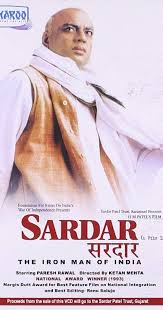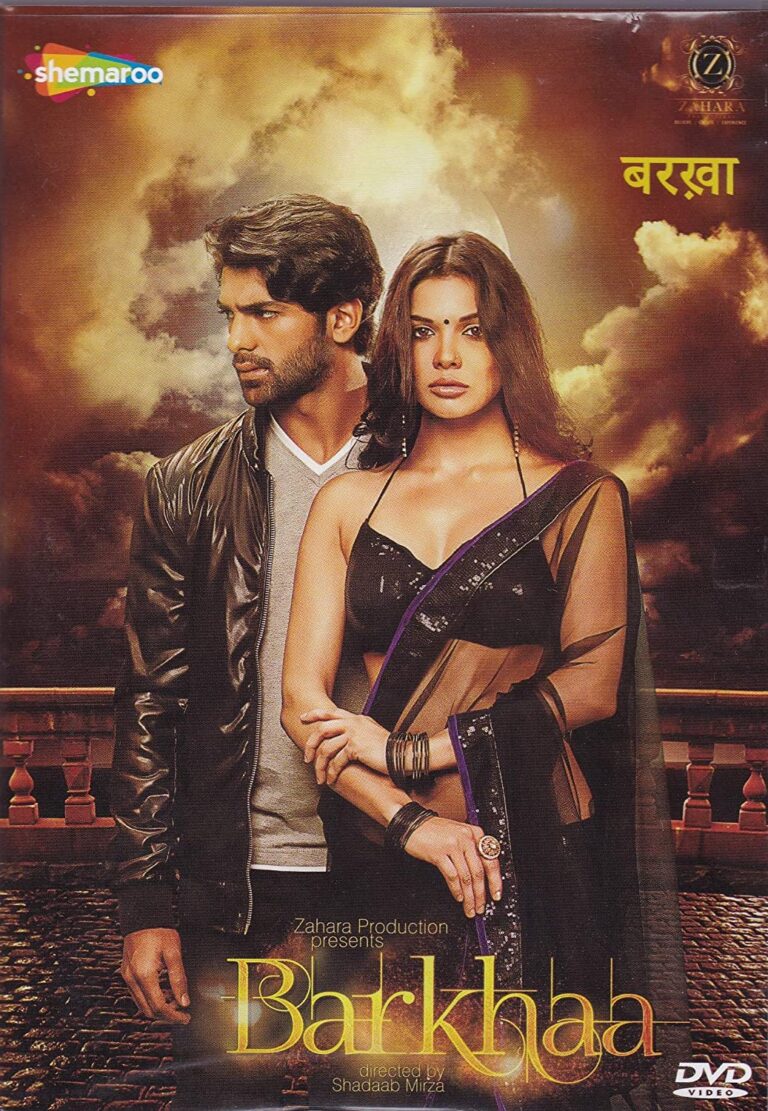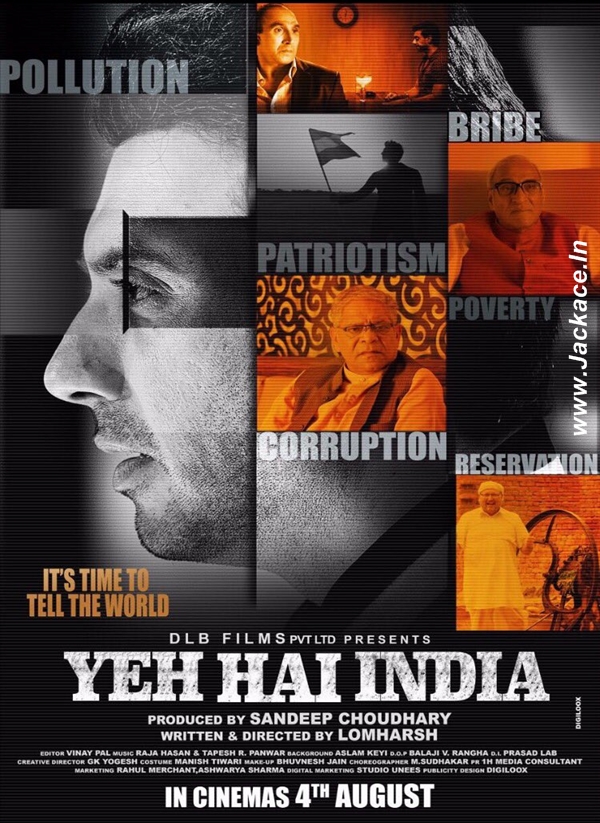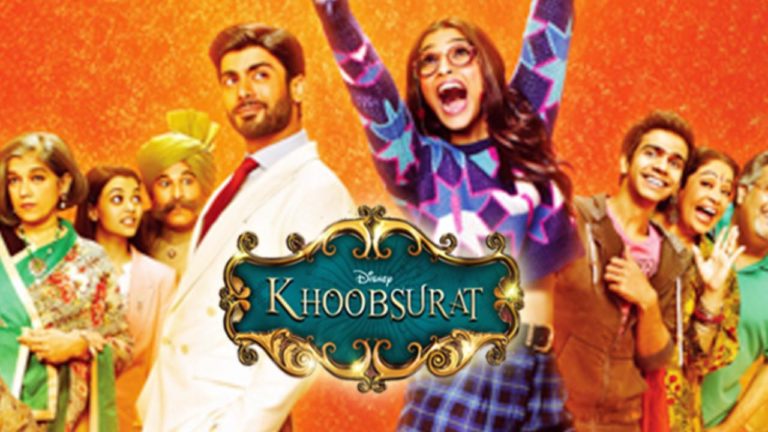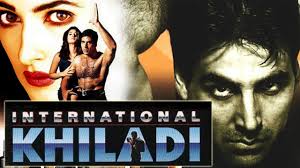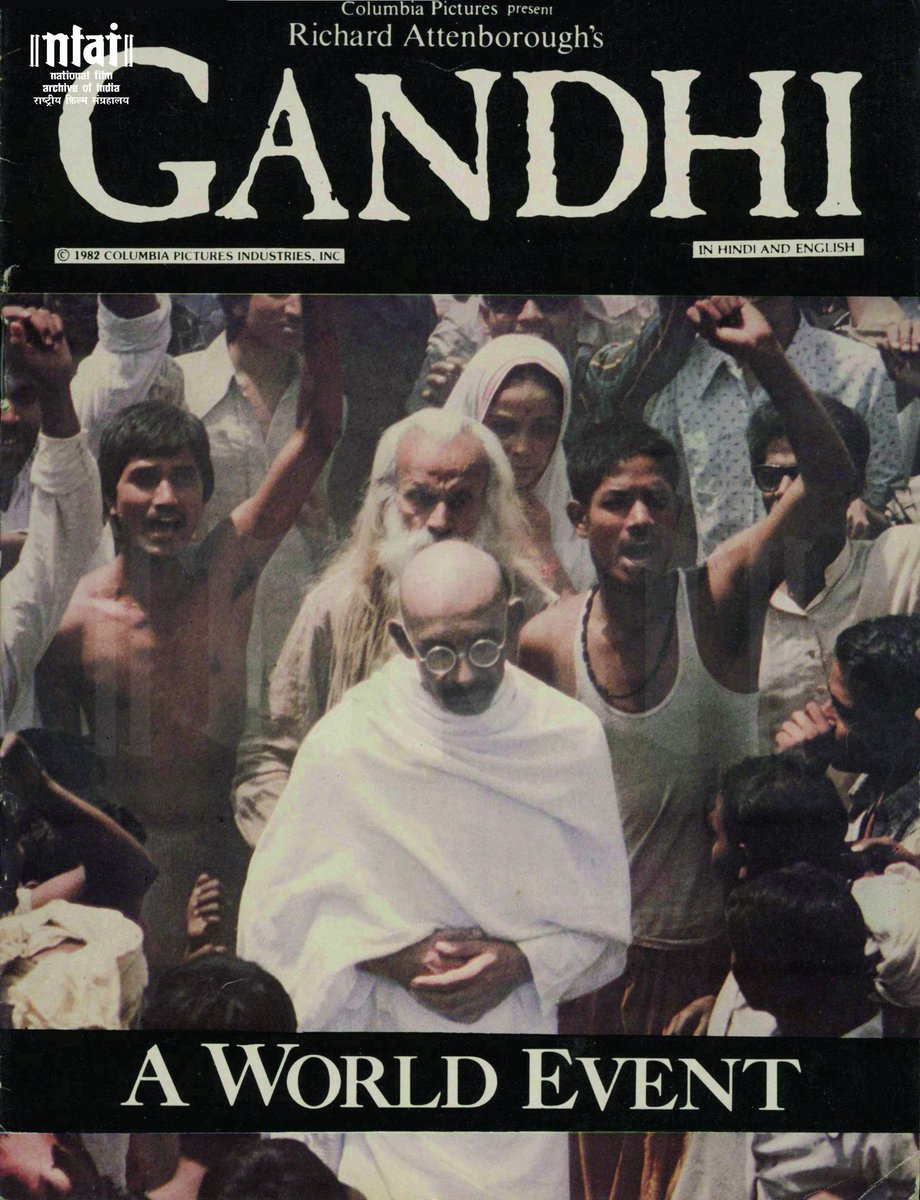
Gandhi (1982-movie) Details :
Gandhi movie is an 1982 period Hollywood biographical film based on the life of Mahatma Gandhi, the leader of non-violent non-co-operative Indian independence movement against the British Raj during the 20th century.
A co-production between India and United Kingdom, it is directer and producer is Richard Attenborough from a screenplay writer is John Briley. It stars Ben Kingsley in the title role. The film covers Gandhi’s life from a defining moment in 1893, as he is thrown off a South African train for being in a whites-only compartment, and concludes with his assassination and funeral in 1948. Although a practicing Hindu, Gandhi’s embracing of other faiths, particularly Christianity and Islam, is also depicted.
Gandhi movie was released in India on 30 November 1982, in the United Kingdom on 3 December, and in the United States on 8 December. It opened to critical acclaim with major praise drawn towards the film’s historically accurate portrayal of the life of Gandhi, Indian independence movement and the deteriorating results of British colonization on India and also Kingsley’s titular performance, production values and costume design. It also became a commercial success grossing $127.8 million on a $22 million budget.
The film received a leading eleven nominations at the 55th Academy Awards (Oscar Awards), winning eight (more than any other film nominated that year), including for the Best Picture, Best Director, and Best Actor (for Kingsley).
The film was screened retrospectively on 12 August 2016 as the opening film at the Independence Day Film Festival jointly presented by the Indian Directorate of Film Festivals and Ministry of Defense, commemorating the 70th Indian Independence Day.The British Film Institute ranked Gandhi as the 34th greatest British film of the 20th century.
- Directer : Richard Attenborough
- Producer : Richard Attenborough
- Writer : John Briley
- Starring : Ben Kingsley, Candice Bergen,Edward Fox,John Gielgud,Trevor Howard,John Mills,Martin Sheen
- Music : Ravi Shankar,George Fenton
- Cinematography : Billy Williams,Ronnie Taylor
- Editor : John Bloom
- Casting : Susie Figgis
- Production Design : Stuart Craig
- Art Direction : Norman Dorme,Robert W. Laing,Ram Yedekar
- Set Decoration : Michael Seirton
- Costume Design : Bhanu Athaiya,John Mollo
- Makeup Department : Paula Gillespie,Tony Horsfield,Vera Mitchell,Connie Reeve,Mariam Samuel,Mustaque Sheikh,Tom Smith,John Webber
- Special Effects : David H. Watkins
- Visual Effects : Martyn Hall,Gary Shaw
- Stunts : Gerry Crampton
- Production company : Goldcrest Films,International Film Investors,National Film Development Corporation of India,Indo-British Films
- Distributor : Columbia Pictures
- Genres : Biography,Drama,History
- Release date : 30 November 1982 (New Delhi),3 December 1982 (United Kingdom),8 December 1982 (United States)
- Running time : 191 minutes
- Country : United Kingdom,India
- Language : English
Gandhi movie Trailer :
Gandhi movie Story :
In 1893, Mohandas K. Gandhi is thrown off a South African train for being an Indian and traveling in a first class compartment. Gandhi realizes that the laws are biased against Indians and decides to start a non-violent protest campaign for the rights of all Indians in South Africa.
After numerous arrests and the unwanted attention of the world, the government finally relents by recognizing rights for Indians, though not for the native blacks of South Africa. After this victory, Gandhi is invited back to India, where he is now considered something of a national hero. He is urged to take up the fight for India’s independence from the British Empire. Gandhi agrees, and mounts a non-violent non-cooperation campaign of unprecedented scale, coordinating millions of Indians nationwide. There are some setbacks, such as violence against the protesters and Gandhi’s occasional imprisonment.
Nevertheless, the campaign generates great attention, and Britain faces intense public pressure. Too weak from World War II to continue enforcing its will in India, Britain finally grants India’s independence. Indians celebrate this victory, but their troubles are far from over. Religious tensions between Hindus and Muslims erupt into nation-wide violence. Gandhi declares a hunger strike, saying he will not eat until the fighting stops. The fighting does stop eventually, but the country is divided. It is decided that the northwest area of India, and eastern part of India (current day Bangladesh), both places where Muslims are in the majority, will become a new country called Pakistan (West and East Pakistan respectively).
It is hoped that by encouraging the Muslims to live in a separate country, violence will abate. Gandhi is opposed to the idea, and is even willing to allow Muhammad Ali Jinnah to become the first prime minister of India, but the Partition of India is carried out nevertheless. Gandhi spends his last days trying to bring about peace between both nations. He thereby angers many dissidents on both sides, one of whom finally gets close enough to assassinate him.
The last fifty years of the life of Mahatma Gandhi leading to his assassination in 1948 is portrayed. In the late 1800’s South Africa, then Indian-British attorney Mohandas K. Gandhi takes up the cause of fighting what he sees as racially discriminatory laws against colored people such as himself and other ethnic Indians. Being that South Africa is part of the British Empire, he is hoping that news of such in the British press will support his cause. Although violence is used against him by the authorities, his protests are only by peaceful means. Having made a name for himself as a motivator of peaceful action which he does not want confused with passivity, Gandhi returns to India in 1915, when he has now abandoned his western clothing for more basic self-made garb of shawls and loincloths. He is asked by prominent Indian figures of the day, such as Jawaharlal Nehru, Vallabhbhai Patel and Muhammad Ali Jinnah, to join the fight for Indian independence from the British, despite some within that group believing Gandhi’s methods ineffective.
Because of internal religious conflicts between the Hindus and minority Muslims among others, the British believe that an Indian self-government would lead to chaos, which to Gandhi is beside the point. But Gandhi’s ability to rally the troops is enough to strike fear in the British controlled authorities, who do whatever they feel they need to quash his quiet revolution while trying not to make him appear the martyr.
Even if Gandhi and his cohorts are able to achieve independence for their homeland, Gandhi must figure out how to control the dissent between the Hindus and the Muslims. Among those documenting the process are American journalist Vince Walker and American photojournalist Margaret Bourke-White, both on the most part sympathetic to Gandhi’s cause.
Star Cast of the film :
- Ben Kingsley as a Mahatma Gandhi
- Rohini Hattangadi as a Kasturba Gandhi
- Roshan Seth as a Jawaharlal Nehru
- Pradeep Kumar as a V. K. Krishna Menon
- Saeed Jaffrey as a Sardar Vallabhbhai Patel
- Virendra Razdan as a Maulana Azad
- Candice Bergen as a Margaret Bourke-White
- Edward Fox as a Brigadier General Reginald Dyer
- Habib Tanvir as a Sir Chimanlal Harilal Setalvad (credited as “Indian Barrister”)
- John Gielgud as a the 1st Baron Irwin
- Trevor Howard as a Judge R. S. Broomfield, the presiding judge in Gandhi’s sedition trial.
- John Mills as a the 3rd Baron Chelmsford
- Shane Rimmer as a Commentator
- Martin Sheen as a Vince Walker, a fictional journalist based partially on Webb Miller.
- Ian Charleson as a Reverend Charles Freer Andrews
- Athol Fugard as a General Jan Smuts
- Geraldine James as a Mirabehn (Madeleine Slade)
- Alyque Padamsee as a Muhammad Ali Jinnah
- Amrish Puri as a Khan (in South Africa)
- Ian Bannen as a Senior Officer Fields
- Richard Griffiths as a Collins
- Nigel Hawthorne as Kinnoch
- Richard Vernon as a Sir Edward Albert Gait, Lieutenant-Governor of Bihar and Orissa
- Michael Hordern as a Sir George Hodge
- Shreeram Lagoo as a Gopal Krishna Gokhale
- Terrence Hardiman as a Ramsay MacDonald
- Om Puri as Nahari
- Dalip Tahil as a Zia, a satyagrahi
- Bernard Hill as a Sergeant Putnam
- Daniel Day-Lewis as a Colin, a young man who insults Gandhi and Andrews
- John Ratzenberger as a American Lt. Driver for Bourke-White
- Pankaj Mohan as a Gandhi’s first secretary, Mahadev Desai
- Pankaj Kapur as a Gandhi’s second secretary, Pyarelal Nayyar
- Anang Desai as a Acharya Kripalani
- Dilsher Singh as a Khan Abdul Ghaffar Khan (Frontier Gandhi)
- Günther Maria Halmer [de] as a Hermann Kallenbach
- Peter Harlowe as a Lord Louis Mountbatten
- Harsh Nayyar as a Nathuram Godse
- Supriya Pathak as a Manu
- Neena Gupta as a Abha
- Tom Alter as a Doctor at Aga Khan Palace
- Alok Nath as a Tyeb Mohammed
- Mohan Agashe as a Tyeb Mohammed’s Friend
- Sekhar Chatterjee as a Huseyn Shaheed Suhrawardy
Production of the film :
This film had been Richard Attenborough’s dream project, although two previous attempts at film shooting had failed. In 1952, Gabriel Pascal secured an agreement with the Prime Minister of India (Jawaharlal Nehru) to produce a film of Gandhi’s life. However, Pascal died in 1954 before preparations were completed
In 1962 Attenborough was contacted by Motilal Kothari, an Indian-born civil servant working with the Indian High Commission in London and a devout follower of Gandhi. Kothari insisted that Attenborough meet him to discuss a film about Gandhi. Attenborough agreed, after reading Louis Fischer’s biography of Gandhi and spent the next 18 years attempting to get the film made. He was able to meet prime minister Nehru and his daughter Indira Gandhi through a connection with Lord Louis Mountbatten, the last Viceroy of India. Nehru approved of the film and promised to help support its production, but his death in 1964 was one of the film’s many setbacks. Attenborough would dedicate the film to the memory of Kothari, Mountbatten, and Nehru.
David Lean and Sam Spiegel had planned to make a film about Gandhi after completing The Bridge on the River Kwai, reportedly with Alec Guinness as Gandhi. Ultimately, the project was abandoned in favour of Lawrence of Arabia (1962). Attenborough reluctantly approached Lean with his own Gandhi project in the late 1960s, and Lean agreed to direct the film and offered Attenborough the lead role. Instead Lean began filming Ryan’s Daughter, during which time Motilai Kothari had died and the project fell apart.
Attenborough again attempted to resurrect the project in 1976 with backing from Warner Brothers. Then prime minister Indira Gandhi declared a state of emergency in India and shooting would be impossible. Co-producer Rani Dube persuaded prime minister Indira Gandhi to provide the first $10 million from the National Film Development Corporation of India, chaired by D. V. S. Raju at that time, on the back of which the remainder of the funding was finally raised. Finally in 1980 Attenborough was able to secure the remainder of the funding needed to make the film. Screenwriter John Briley had introduced him to Jake Eberts, the chief executive at the new Goldcrest production company that raised approximately two-thirds of the film’s budget.
Film Shooting :
Shooting Started on 26 November 1980 and ended on 10 May 1981. Some scenes were shot near Koilwar Bridge, in Bihar. Over 300,000 extras were used in the funeral scene, the most for any film, according to Guinness World Records.
Casting of the film :
During pre-production, there was much speculation as to who would play the role of Gandhi. The choice was Ben Kingsley, who is partly of Indian heritage (his father was Gujarati and his birth name is Krishna Bhanji).
Release of the film :
Gandhi premiered in New Delhi, India on 30 November 1982. Two days later, on 2 December, it had a Royal Premiere at the Odeon Leicester Square in London in the presence of Prince Charles and Princess Diana. The film had a limited release in the US on Wednesday, 8 December 1982, followed by a wider release in January 1983.
Gandhi Movie Review :
This film review are Mostly Positive from Critics, IMDB Public Reviewing site give 8.0 Star Out Of 10 Star with Reviewers are 2,15,603.
In her diary entry of Saturday, February 27, 1943, Anne Frank wrote in passing (translated from the Dutch): “The freedom-loving Gandhi of India is holding his umpteenth fast.”
It’s a comment at once mildly comical and respectfully admiring, one I think the Mahatma would have appreciated with a twinkle and a laugh. He and Miss Frank are linked with the Reverend Martin Luther King, Jr., as the civil rights spokesperson-giants of the 20th century. And civil rights, and the reversal of the institutionalized violation of the same, are a large part of what the last century’s politics were all about. Movie viewers are apt to find in the diary remark a distillation of their experience of the Richard Attenborough film. A recommendation is that it be followed by rentals of Saving Private Ryan and The Long Walk Home, which together convey the investment put into the respective causes the trio represented.
At the beginning of Gandhi we confront these words: “No man’s life can be encompassed in one telling. There is no way to give each year its allotted weight, to include each event, each person who helped to shape a lifetime. What can be done is to be faithful in spirit to the record, and to try to find one’s way to the heart of the man….”
The script is replete with these kinds of memorable words, and with others that reflect its subject’s political acumen and strategical cleverness.
Kingsley is sublime in the lead role. Saeed Jaffrey, Roshan Seth, and Alyque Padamsee do well as Gandhi’s pro-independence collaborators. Ditto, Athol Fugard (“Assuming we are in agreement?”) and John Gielgud (“Salt?”) as two of his adversaries. Charleson, in his clerical collar, looks like he has walked in off the set of the preceding year’s Academy Award winner, Chariots of Fire (where he played the Scottish sprinter-missionary, Eric Liddell).
This movie won eight Oscars, with Attenborough, Briley, and Kingsley all earning honors. No other film biography I ever have seen works so well. It will stand the test of time and inform multiple generations. One doubts remakes will be necessary.
Critics Rating David Parkinson, from Times Of India give 3 star out of 5 Star.
Gandhi Movie Awards :
Gandhi Movie Box Office Collection :
——————–
Other Related Film Post :

